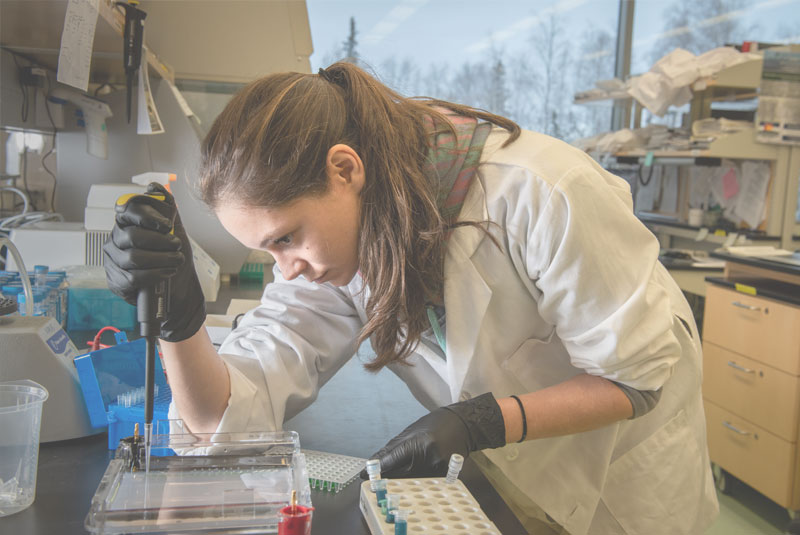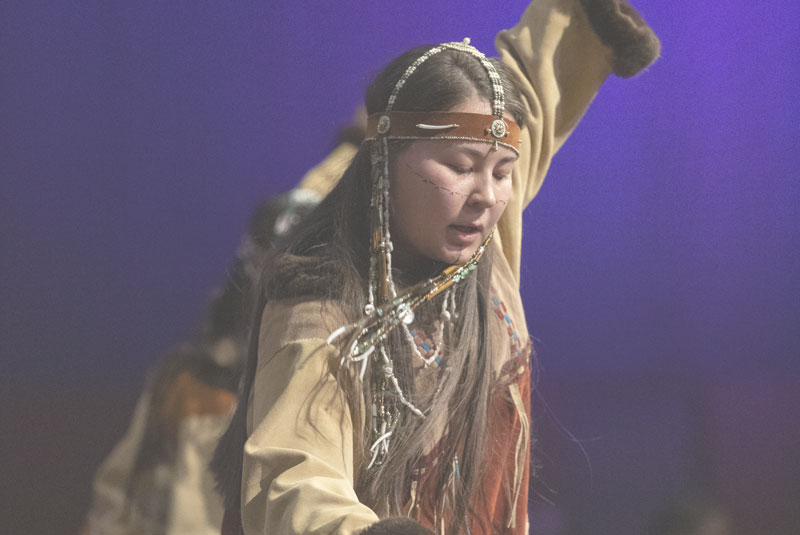Geological Sciences B.S.
Explore the geological sciences bachelor’s degree program at the University of Alaska Anchorage
If you enjoy working outdoors, have a strong scientific background and are interested in earth processes, 99�þþ�Ʒ’s B.S. in geological sciences could be right for you. Nowhere else in the country can you find active plate tectonics, erupting volcanoes, calving glaciers and North America’s highest mountain, all of which are within driving distance of 99�þþ�Ʒ.Geological sciences scholarships and financial aid
As a geology major at 99�þþ�Ʒ, you may qualify for numerous scholarships, awards and grants that help pay for college. 99�þþ�Ʒ scholarship opportunities include the Dr. Ruth A.M. Schmidt Memorial Scholarship. Local and national organizations and private funders include the American Institute of Professional Geologists, the Alaska Geological Society, the Geophysical Society of Alaska, the Chugach Gem and Mineral Society, the Alaska Space Grant Program, the Cook Inlet Regional Citizens Advisory Council and the Edward and Anna Range Schmidt Charitable Trust. Learn more about financial aid opportunities at 99�þþ�Ʒ.
Geographic and geologic location
Observe features developed over the past several hundred million years. Explore the effects of natural events, such as the 1964 Great Alaska earthquake. Access dozens of field locations within an hour drive. All of these experiences and more are available to you at the 99�þþ�Ʒ.
Flexible program options
Among the program’s diverse spectrum of courses, the 99�þþ�Ʒ Geological Sciences department offers some online classes that fulfill program requirements and help you earn your degree.
Connecting higher education and local industry
The professional geological sciences community in Anchorage and across Alaska is actively involved with and invested in the success of 99�þþ�Ʒ’s geology program. Local companies provide internships, guest speakers, field placements, program donations and more to enhance your learning opportunities. For example, the is home to the Alaska Volcano Observatory and the Alaska Science Center, and is within walking distance of 99�þþ�Ʒ. The USGS provides students with networking and internship opportunities with professional geologists.
Geological Sciences Community Advisory Board
Board members include industry professionals, Alaska Native Corporations, multiple state and federal agencies and 99�þþ�Ʒ geology alumni who help the department create opportunities for you to be competitive and successful after you graduate.
Student clubs and activities
Join clubs and activities on campus that fit your interests, such as the student-run Geology Club and 99�þþ�Ʒ’s student chapter of the American Association of Petroleum Geologists. You also have opportunities to attend special events such as the Alaska Geological Society Spring Technical Conference and the Alaska Miners Association annual conference in Anchorage.
Did you know..
99�þþ�Ʒ Geological Sciences is the only geology department in the world with two current editorial board members for Geology. This geoscience publication has been the Web of Science’s top-ranked journal in the field for 11 years in a row, and it tops the list in the Thomson Reuters Journal Impact Factor 2016 Rankings.
What can you do with a geology degree from 99�þþ�Ʒ?
Compete for high-impact geoscience jobs in Alaska and beyond. Recent 99�þþ�Ʒ program alumni have been accepted into competitive graduate programs, including the top-ranked geology school in the country.Geological sciences graduate programs
99�þþ�Ʒ alumni have attended prestigious geoscience programs such as the #1-ranked University of Texas at Austin, as well as the University of Utah and the University of Nevada-Las Vegas. But you don’t have to go far to earn your graduate degree. The University of Alaska Anchorage offers its own M.S. in applied geological sciences, which is growing in reputation.
Geological sciences careers
Geoscientists and geologists find high-impact careers in a variety of industries, including:
- Oil and gas
- Mining and resource exploration
- Environmental geoscience
- Geological and geotechnical engineering
- Federal and state governments and agencies, such as the U.S. Geological Survey, the National Parks Service and the U.S. Forest Service.
By the numbers..
Geological sciences bachelor’s degree program highlights
With a mix of classroom, laboratory and field-based instruction, you will receive hands-on training and experience that prepare you to work in high-impact jobs for geology majors.- Apply classroom-based learning to field observations. Rigorous field-based instruction provides opportunities to develop skills that will prepare you for graduate programs and careers in geosciences. These include field trips around Alaska, as well as to locations in Utah, Nevada and California.
- Engage in transformative undergraduate research experiences. As a geological sciences major, you will have a variety of opportunities to participate in faculty-led research projects and co-author published findings in peer-reviewed scientific journals. Faculty research interests include geochemistry, minerals, igneous petrology, sedimentology, stratigraphy, structural geology, geomechanics, geophysics, petrophysics, petroleum geology, hydrogeology and planetary geology.
- Receive instruction from internationally recognized faculty whose experiences enhance student learning. They include a Geological Society of America Fellow and two editorial board members of the world-renowned Geology journal. The department’s faculty are active researchers who have successfully competed for national and local research funding, presented their work at national conferences and gotten published in high-impact scientific journals.
- Prepare for your career through professional development. 99�þþ�Ʒ hosts local and national employers who conduct on-campus interviews for permanent or seasonal geoscience jobs and internships in mining and other industries.
- Explore more with advanced resources and equipment. The ConocoPhillips Computational Lab includes 20 Windows-based workstations with more than $100M worth of state-of-the-art software used by professional geoscientists for subsurface visualization and data analysis. A facility like this, rarely found in geology programs, will help you develop the experience and skills to be exceptionally competitive in the geoscience job market. You will also have access to geochemical analytical facilities, including the Applied Science Engineering and Technology Lab; an on-campus stable isotope facility; and a dedicated facility for rock sample preparation, which houses a jaw crusher, disk mill, trim saw, shatter box, oil saw and a heavy liquids lab with a magnetic separator for zircon extraction.
Amazing stories from geology majors
Choosing 99�þþ�Ʒ for my undergraduate degree in geoscience was one of the best decisions I could have made! After conducting an undergraduate thesis with Dr. Jennifer Aschoff and working as an undergraduate research assistant to Dr. LeeAnn Munk, the potential graduate school advisors I considered all remarked on my extensive research/field background. Dr. Aschoff and I are working towards publishing my undergraduate research, and ultimately, I hope to gain a tenure-track position in tectonics/sedimentology. My academic career successes have been made possible by the mentorship of many of the 99�þþ�Ʒ faculty, with whom I have maintained close ties.
Geological sciences bachelor’s degree program curriculum
The B.S. degree in geological sciences has been carefully designed to progressively develop your knowledge, skills and abilities as you work your way through a sequential curriculum. With three pathways into the degree at the first year level, you can proceed into the major no matter what your geology introductory course is.Field-based learning is integrated into the curriculum from early on, with a capstone field experience your senior year. Many classes also include lab-based experiential learning. Although you can specialize in the environmental geological sciences track, the overall curriculum is designed to provide a wide breadth of geological sciences training to maximize your marketability in a wide range of job fields.
Top classes for geological sciences majors
- Learn the basic computational methods for visualization and analysis of geologic data in Geological Data Visualization and Analysis.
- Prepare for a scientific career with science writing, professional presentations, research dissemination and grant funding proposals in Professional Practices.
















